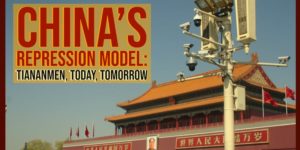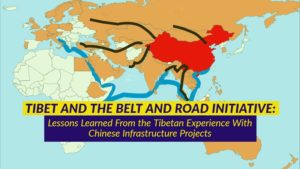
National Endowment for Democracy (NED)
The decision to invite Beijing into the world economic system in 2001 has not led to anything like the more liberal or democratic China that world leaders had envisaged, only a more powerful and more draconian adversary that has grown and grown while the U.S. and its allies (including Britain and Australia) were distracted in the Middle East and Afghanistan, The Atlantic’s Tom McTague contends. In effect, the U.S. is having to adapt to the new world of Chinese power in order to protect the old “free and open” world of global trade and American supremacy that Washington built after the Second World War.
To respond to Beijing’s ideological challenge, advocates of democracy must have a better understanding of what China aims to achieve by exporting its political model and how its actions are weakening democracy globally, according to the Wilson Center’s Charles Edel and David O. Shullman, Director of the Atlantic Council’s China Global Hub.
China’s international efforts to subvert democracy* fall into three broad categories, they write for Foreign Affairs:
- The first includes its attempts to shape the narrative about China in developed countries. In nations ranging from Canada and Germany to Australia and Japan, Beijing aims to silence critics of China and amplify the voices of individuals and institutions that promote closer ties with Beijing or a more positive portrayal of China. Beijing wields both threats and inducements to this end, rewarding positive portrayals and punishing criticism. ….China offers preferential market access to friendly governments, academic institutions, and businesses but retaliates financially against those it sees as hostile to China’s interests. ….
- The second category of antidemocratic actions are those that take place in developing countries. Unlike in the developed world, where China’s political and economic coercion and “Wolf Warrior” diplomacy have engendered a growing backlash, Beijing has received a warmer welcome in many developing countries, where elites hope to learn from a political system that has enabled China’s transformation into the world’s second-largest economy. …China offers more than simple inspiration for a nondemocratic governance model: it provides the tools, training, and resources that permit leaders to ignore democratic countries’ demands for good governance and respect for individual rights as a condition of aid and investment. …
- The last category of international antidemocratic actions involves those aimed at weakening international institutions that instill democratic norms and creating new ones that do not, thereby neutering the liberal presumptions that prevail in the current global order. ….
A case in point…..
The World Bank has canceled a prominent report rating the business environment of the world’s countries after an investigation concluded that senior bank management pressured staff to alter data affecting the ranking of China and other nations. The “Doing Business” report has been the subject of an external probe into the integrity of the report’s data, The Wall Street Journal reports:
Although the data gathering process for the report was finished, the World Bank’s economists reopened the data tables and altered China’s data, the investigative report said. Instead of ranking 85th among the world’s countries, China climbed to 78th due to the alterations. A series of smaller changes detailed in the investigative report also affected the rankings of Azerbaijan, the United Arab Emirates and Saudi Arabia.

National Endowment for Democracy
The United States and its allies must shore up their defenses and push back against China by cultivating democracy at home as well as abroad, Edel and Shullman conclude. Failure to do so could imperil the current international order—and make the future unsafe for democracy.
But it is important to make a distinction between the “China model” and the “Xi model”, The FT’s Gideon Rachman observes:
The China model of reform and opening, put in place by Deng Xiaoping, was based on a rejection of the cult of personality. Deng urged officials to “seek truth from facts”. Policy should be guided by a pragmatic observation of what works, rather than the grandiose statements of Chairman Mao. To allow officials to experiment with new economic policies, it was crucial to break with the fear and dogma associated with an all-powerful leader. Term limits for the Chinese presidency were introduced in 1982, restricting any leader to two five-year terms.
From Stalin’s Russia to Ceausescu’s Romania to Kim’s North Korea and Castro’s Cuba, the combination of a personality cult and Communist Party rule is usually a recipe for poverty and brutality, notes Rachman, observing that the Chinese Communist party has once again embraced a personality cult.
 The distinction between authoritarian and totalitarian states captures a crucial difference between illiberal regimes, argues John Gray. Authoritarian states are dictatorial in their methods but limited in their goals, whereas totalitarian states attempt to transform society and intrude into every area of human life, he writes for The New Statesman:
The distinction between authoritarian and totalitarian states captures a crucial difference between illiberal regimes, argues John Gray. Authoritarian states are dictatorial in their methods but limited in their goals, whereas totalitarian states attempt to transform society and intrude into every area of human life, he writes for The New Statesman:
Bismarck’s Prussia and late tsarist Russia fall into the former group, and National Socialist Germany and the Soviet state throughout most of its history into the latter. Xi’s China has moved into the totalitarian category. Through the 95 million-strong Chinese Communist Party, which celebrated its centenary on 1 July this year, the state aims to be omnipresent throughout society. … The attempt to erase the Uighurs as a people is the most obvious example….
The European Union will launch “Global Gateway” as a scheme to compete with China’s Belt and Road Initiative, POLITICO reports.
 “We want to turn Global Gateway into a trusted brand around the world,” European Commission President Ursula von der Leyen didn’t shy away from her primary target — China, which has been criticized by the West for extending its strategic reach and creating debt dependence through its multibillion-dollar infrastructure and investment scheme.
“We want to turn Global Gateway into a trusted brand around the world,” European Commission President Ursula von der Leyen didn’t shy away from her primary target — China, which has been criticized by the West for extending its strategic reach and creating debt dependence through its multibillion-dollar infrastructure and investment scheme.
“We want to create links and not dependencies!” she said.
Xi Jinping appears to have put China’s Wolf Warrior diplomats on the leash – at least for now, writes Nikkei analyst Katsuji Nakazawa. However…..
A Summit for Democracy to be hosted by Biden in December. The summit will bring together “heads of state, civil society, philanthropy, and the private sector,” according to the White House. ….The December summit will be held virtually. But if Taiwanese President Tsai Ing-wen takes part in any way, it would mark a serious setback for the Xi administration.
*A key dimension of what the NED’s International Forum calls Beijing’s sharp power.
Analysis: Wolf warriors fall silent as Xi ponders U.S. strategy https://t.co/WH29z9ay40
— Democracy Digest (@demdigest) September 16, 2021







